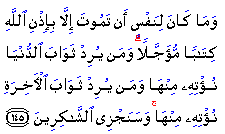Reward of the Grateful, Brotherhood, Worthy Resolutions
Issue 313 » February 11, 2005 - Muharram 2, 1425
General
| Living the Quran |
Al-Imran
(The House of Imran)
The purpose of this directive is to bring home to the Muslims that it would be futile for them to try to flee from death. No one can either die before or survive the moment determined for death by God. Hence one should not waste one's time thinking how to excape death. Instead one should take stock of one's activities and see whether one's efforts have either been directed merely to one's well-being in this world or to well-being in the Hereafter. The word 'thawab' denotes recompense and reward. From the Islamic point of view, the crucial question bearing upon human morals is whether a man keeps his attention focused on the worldly results of his endeavours or on the results which will acrue to him in the Next World. The 'ones who are grateful' are those who fully appreciate God's favour in making the true religion available to them, and thereby intimating to them knowledge of a realm that is infinitely vaster than this world. Such people appreciate that God has graciously informed them of the truth so that the consequences of human endeavour are not confined to the brief span of earthly life but cover a vast expense, embracing both the present life and the much more important life of the Hereafter. He does so even though he may sometimes find that, far from bearing fruit, righteousness leads to privation and suffering in this world. Source: |
| Understanding the Prophet's Life |
| The Brotherhood between the Muslims Following the migration to Madinah, the first task that the Prophet (peace be upon him) attended to was the construction of a Mosque. After the construction of this mosque was complete, the Prophet turned his attention to cementing the ties of mutual brotherhood among the Muslims of Madinah, Al-Ansar (the Helpers) and Al-Muhajirun (the Emigrants). A gathering of 90 men, half of whom were Emigrants and the others Helpers assembled in the house of Anas bin Malik where the Prophet gave the spirit of brotherhood his official blessing. Brotherhood-in-faith was holding subordinate every distinction of race and kindred and supporting the Islamic principle: none is superior to the other except on the basis of piety and God-fearing. The Prophet attached to that brotherhood a valid contract; it was not just meaningless words but rather a valid practice relating to blood and wealth rather than a passing impulse taking the form of accidental greeting. The atmosphere of brotherhood created a spirit of selflessness infused deeply in the hearts of his followers, and produced very healthy results. For example, Sa'd bin Ar-Rabi', a Helper, said to his fellow brother 'Abdur-Rahman bin 'Awf, "I am the richest man among the Helpers. I am glad to share half of my property with you. I have two wives, I am ready to divorce one and after the expiry of her 'Iddah (the prescribed period for a woman divorcee to stay within her house unmarried), you may marry her." But 'Abdur-Rahman bin 'Awf was not prepared to accept anything, neither property nor home. So he blessed his brother and said, "Kindly direct me to the market so that I may make my fortune with my own hands." And he did prosper and got married very shortly by his own struggle. The Helpers were extremely generous to their brethren-in-faith. Abu Hurairah reported that they once approached the Prophet with the request that their orchards of palm trees should be distributed equally between the Muslims of Madinah and their brethren from Makkah. But the Prophetwas hesitant to put this heavy burden upon them. It was, however, decided that the Emigrants would work in the orchards along with the Helpers and the yield would be divided equally among them. Such examples point directly to the spirit of cordiality, sacrifice and selflessness on the part of the Helpers, and also to the feeling of appreciation, gratitude and self-respect that the Emigrants held dear to their hearts. They took only what helped them make a reasonable living. In short, this policy of mutual brotherhood was so wise and timely that many obstinate problems were resolved wonderfully and reasonably. Source: |
| Cool Tips! |
Worthy New Year Resolutions Will join a Halaqa - an Islamic study group
Will not let myself be bored or sit idle
Will find a poor, needy, unemployed, sick, orphan, lonely Muslim in my community and befriend him or her.
Source:
|
